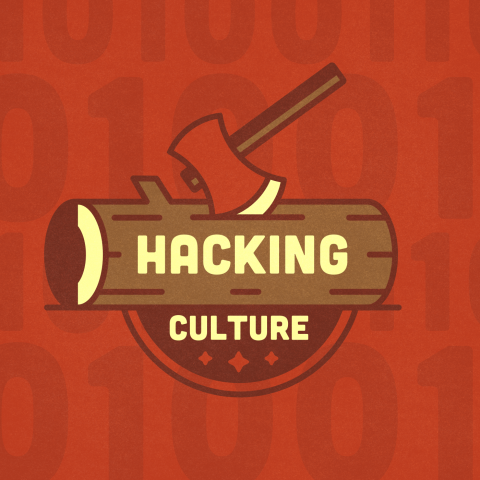
Hacking Culture explores a variety of topics, from hacking your brain with mindfulness to software that gives people freedom from surveillance capitalists. Episodes feature interviews with meditation teachers, neurologists, free-software advocates, academics, and anyone else who can help us better understand the technology, science, and embodied practices that contribute to well-being.
Matthew Tift talks with Yvette Erasmus about building healthy relationships at home and work with nonviolent communication (NVC), including:
- An overview of NVC
- The difference between "street NVC" and classic NVC
- The ethics of NVC
- Bringing NVC into the workplace (in stealth mode)
- How accepting the present moment might needs for safety and security in the world
- An overview of NVC
- The difference between "street NVC" and classic NVC
- The ethics of NVC
- Bringing NVC into the workplace (in stealth mode)
- How accepting the present moment might needs for safety and security in the world
Matthew Tift talks with Dori Kelner, a mindfulness teacher, yoga teacher, and a long-time member of the Drupal community. She founded Insightful Culture to provide evidence-based wellness practices to those who want a proven method for calming their inner critic and moving through life with greater ease. In this episode, we discuss topics such as:
- Dori's transition from developer to manager to yoga teacher to workplace mindfulness facilitator
- The differences between mindfulness, meditation, and yoga
- How to tell when an organization might be ready to incorporate mindfulness practices into their culture
- Potential goals of a workplace mindfulness program
- Dori's approach to "discovery" when she's working with clients
- The difference between training leaders and training employees
- The Mindfulness Based Stress Reduction (MBSR) method
- The role of metrics in a workplace mindfulness program
- Dori's transition from developer to manager to yoga teacher to workplace mindfulness facilitator
- The differences between mindfulness, meditation, and yoga
- How to tell when an organization might be ready to incorporate mindfulness practices into their culture
- Potential goals of a workplace mindfulness program
- Dori's approach to "discovery" when she's working with clients
- The difference between training leaders and training employees
- The Mindfulness Based Stress Reduction (MBSR) method
- The role of metrics in a workplace mindfulness program
Matthew Tift talks with Nicole Lovald about the differences between therapy and contemplative practices, such as yoga and meditation. We also discuss topics such as:
- The practice of integrative therapy
- Approaches for dealing with anxiety
- Gaining control by being a witness to our own thoughts
- What science tells us about the various approaches
- The "window of tolerance"
- The importance of belly breathing
- Why someone might choose yoga, meditation, or therapy
- The practice of integrative therapy
- Approaches for dealing with anxiety
- Gaining control by being a witness to our own thoughts
- What science tells us about the various approaches
- The "window of tolerance"
- The importance of belly breathing
- Why someone might choose yoga, meditation, or therapy
In this episode Matthew Tift talks with Angie Byron, the Principal Community Manager at MongoDB and a Drupal Core Committer. They discuss a wide range of issues related to cultivating well-being in open-source communities, such as:
- Angie's early experiences in the Drupal project making cultural norms explicit, creating codes of conduct, and establishing procedures for conflict resolution
- How Drupal has positively impacted the lives of its members
- Contributing to something bigger than yourself
- Setting up structures to prevent burnout within communities
- Challenges in monitoring community health
- How her participation in the Drupal community affected her personal life, both positively and negatively
- How community wellness checks might benefit an open-source community
- How Drupal agencies support the overall well-being of the Drupal community
- Angie's transition to working in the MongoDB community
- The joy she gets helping individuals find their place in a community
Since 2006, Angie has done incredible work helping to grow the Drupal community. On the subject of what all of us can do to help cultivate well-being, her advice is "Look out for your people."
The theme music used in this episode comes from the Open Goldberg Variations.
- Angie's early experiences in the Drupal project making cultural norms explicit, creating codes of conduct, and establishing procedures for conflict resolution
- How Drupal has positively impacted the lives of its members
- Contributing to something bigger than yourself
- Setting up structures to prevent burnout within communities
- Challenges in monitoring community health
- How her participation in the Drupal community affected her personal life, both positively and negatively
- How community wellness checks might benefit an open-source community
- How Drupal agencies support the overall well-being of the Drupal community
- Angie's transition to working in the MongoDB community
- The joy she gets helping individuals find their place in a community
Since 2006, Angie has done incredible work helping to grow the Drupal community. On the subject of what all of us can do to help cultivate well-being, her advice is "Look out for your people."
The theme music used in this episode comes from the Open Goldberg Variations.
Matthew Tift talks with Stephanie Wagner about Healthy Minds Innovations, their Health Minds @Work program, and "hacking the mind." They talk about tools that cultivate and measure well-being. They discuss various critiques of workplace wellness programs and how Healthy Minds might be able to support your company or organization.